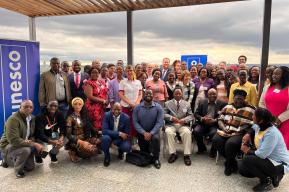News
UNESCO, Civil Society and Pakistan Information Commission Join Hands to Strengthen Access to Information Online

As part of UNESCO’s International Day for Universal Access to Information, civil society – Peace and Justice Network with partners including the Pakistan Information Commission and the Embassy of the Kingdom of the Netherlands held a conference in Islamabad on September 28, 2023. More than 100 participants including transgender, youth, information commissioners, parliamentarians, and representatives from minority groups participated in the event.
Taking this year’s global agenda “the importance of online space for Access to Information” forward, the national conference mapped priorities to address challenges faced by marginalized in accessing information online. It is crucial for persons with disabilities, transgender and religious minorities, etc., to have equal access to information to promote inclusivity. The information and its access if effectively utilized can become a means for empowerment, justice, and equal participation in society.
Keeping the United Nations shared value of “leaving no one behind” at the core, it is imperative to ensure that these groups leverage online spaces. The online space(s) have become an indispensable resource for many communities, including marginalized groups. They are not only offering a space to engage in public discourse but is an earning source. Marginalized communities already stigmatized can leverage these spaces to uplift themselves socially and economically. Therefore, it is necessary to realize that online spaces and by extension internet needs to be integrated with rights perspective. An approach developed by UNESCO that safeguards rights, is open and accessible for all and consists of represents pluralism.
Former senator Farat ullah Babar highlighted the need for government institutions to enhance access to information to strengthen democratic values in the country. On strengthening the role of information commissions Chief Information Commissioner, Shoaib Ahmad Siddiqui stressed on the need for more proactive disclosure to promote a culture of accountability and transparency.
Deputy Ambassador of the Kingdom of the Netherlands, H.E. Mr. Hajo Provo Kluit recognized the importance of access to information for marginalized groups in ensuring stronger institutions.
Key experts from diverse backgrounds prepared recommendations and presented their plans to duty bearers including Ministry of Human Rights, Information Commission and Information and Broadcasting. As custodians of the access to information and fundamental rights the speakers provided their inputs to the policy recommendations. These policy recommendations will be further shared with Pakistan Information Commission to integrate in their agenda.
The caretaker minister for Human Rights, Khalil George concluded the proceedings with resolve to protect fundamental rights of marginalized groups.
The 74th UN General Assembly proclaimed 28 September as the International Day for Universal Access to Information (IDUAI). UNESCO as the custodian agency strives for progress on SDG indicator 16.10.2: to support member states to adopt and implement constitutional, statutory and/or policy guarantees for public access to information.








